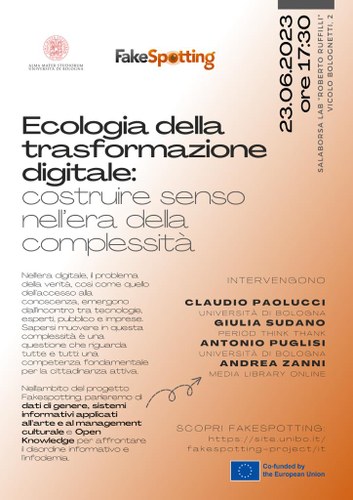
Data: 23 giugno 2023 dalle 17:30 alle 19:30
Luogo: Vicolo Bolognetti 2, Bologna
Il problema della verità, così come quello dell’accesso alla conoscenza e del “viaggio” dei dati non sono più appannaggio di pochi ricercatori, ma è un tema che emerge dall’incontro materiale tra tecnologie, esperti, designer, utenti non esperti, pubblico e imprese. Nel quadro del progetto FakeSpotting, abbiamo chiesto a tre esperti di digitale di raccontarci la loro esperienza con i dati di genere, i sistemi informativi applicati all’arte e l’Open Knowledge.
Orario:
Venerdì 17.30-19.30
Partecipanti:
Claudio Paolucci, Giulia Sudano, Antonio Puglisi, Andrea Zanni
The University of Bologna, in cooperation with the digital culture Library Salaborsa Lab and the Liquid Lab project, organised the Multiplier Event on June 23, 2023, in Bologna, in the form of a panel discussion after the presentation of the Fakespotting online course. The invited participants were members of educational and cultural associations and institutions.
MediaLibraryOnLine Agenda:
17:30-17:45 Registration of participants and welcome
17:45-18:15 Introduction from Dr. Marco Giacomazzi (FakeSpotting trainer) and presentation of the Fakespotting online course
18:15-19:30 Panel discussion on the issues of how to make sense of digital practices from different perspectives
19:30-20:00 Q&A between the speakers and the public
Summary: The event commenced with an introduction to the FakeSpotting project and its four Intellectual Outputs, presented by one of the project trainers. During this introduction, the trainer shared insights derived from the six modules of the course, guided attendees on accessing the e-learning platform, and provided information about the forthcoming distribution of the toolkit and the collection of case studies. Following the presentation of the FakeSpotting outputs and content, a panel discussion followed, focusing on the intricacies of the contemporary digital landscape and seeking to address the challenge of making sense in a digital environment characterized by information disorder and overload. To gain a comprehensive understanding of today's digital landscape, the invited speakers shed light on the perspectives of professionals who engage with digital media on a daily basis. The central themes of this discussion encompassed truth assessment, open knowledge, and the societal implications of data.
The objective of this discourse was to underscore that these concerns extend beyond the exclusive domain of a select few researchers: rather, they emerge
from tangible interactions involving technologies, experts, designers, lay users, the general public, and businesses. Consequently, Professor Claudio Paolucci elaborated on communication practices and truth assessment when employing digital media. Giulia Sudano elucidated how Period Think Tank leverages data to address issues of inequality and social significance. Professor Antonio Puglisi presented his consultancy work with a company dedicated to detecting deepfake media, implementing technical trustworthiness. Digital Media Librarian Andrea Zanni discussed the evolution of the internet's various stages and how the reputation and function of open repositories, such as Wikipedia, have evolved over time. The discussion eventually pivoted towards the pressing matter of information disorder and how it underscores the urgency of developing the capability to navigate this complexity. This highlighted the importance of making digital literacy and education a concern for all, as it constitutes a fundamental skill for active citizenship. These themes align with the core objectives of the FakeSpotting project, which seeks to disseminate digital culture. This involves equipping citizens with the requisite skills to address informational disorder and infodemics, all while promoting an approach to media education that refrains from vilifying technology and instead places emphasis on a critical, conscious, and constructive engagement with media.
Event Link: https://dfc.unibo.it/it/eventi/ecologia-della-trasformazione-digitale
https://www.facebook.com/events/194369969932741/?ref=newsfeed
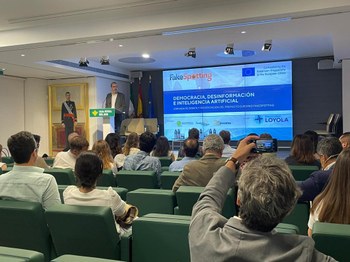
UNIVERSIDAD LOYOLA ANDALUCIA - Multiplier Event
Description: Loyola University, as a partner of the FakeSpotting project, was in charge of planning a Multiplier Event in Seville (Spain) on May 11, 2023. The purpose was to bring together stakeholders in the project's theme. For this purpose, a round table was organized: "Democracy, disinformation and artificial intelligence. Day of debate and presentation of the European project FakeSpotting", to which a number of local and national experts in disinformation and artificial intelligence were invited strategically by their profiles: - Juan Pablo Bellido, dean of the Professional Association of Journalists of Andalusia; Inmaculada García, co-editor of the program "Los Reporteros" of Canal Sur TV. - Pilar Sánchez, professor at the University of Valladolid. - Roberto Arrocha, Head of Investigation of the newspaper ABC de Sevilla. - Francho Barón, CNN journalist and director of the Master's Degree in Multiplatform Digital Journalism Loyola CNN. - Ángel Fernández Millán, vice dean of the Professional Association of Journalists of Andalusia.
In order to reach our target audience, a mailing was sent out to the media to cover and disseminate information about the event (Seville Press Association, Association for the Progress of Communication, Professional Association of Journalists of Andalusia, educational institutions (schools, institutes, libraries and universities) and media literacy professionals (Audiovisual Council of Andalusia, Telekids Workshop and foundations).
On the university's website, in the events agenda section, a form was set up to facilitate the registration of attendees. Two press releases were prepared: one for the call (with its respective adaptation for distribution on social networks as well), and another one after the event for agencies and media in
which the main milestones of the Fakespotting project and the ideas of the experts were collected. We also designed the corresponding posters to announce the event, which were adapted to communicate it on social networks more focused on photography (Instagram and Twitter) and a roll-up for the auditorium where the multiplier event was held. In total we reached more than fifty attendees and the appearance in the following media.
Agenda:
-18:30h. Welcome and presentation of the event By Juan Pablo Bellido (Dean of the Professional Association of Journalists of Andalusia)
- 18:40h. The university in the face of disinformation. Presentation of the European project FakeSpotting Dr. Paula Herrero Diz (Professor of Journalism at Universidad Loyola Andalucía and coordinator of FakeSpotting)
- 19:00h. Round table and debate Journalism and democracy in the face of disinformation and Artificial Intelligence Teodoro León Gros (Journalist at Canal
Sur and ABC and professor at the University of Malaga) Pilar Sánchez García (Lecturer at the University of Valladolid) Roberto Arrocha (Research director of ABC Sevilla and lecturer at Universidad Loyola Andalucía) Francho Barón (CNN journalist and director of the Master's Degree in Journalism at Loyola-CNN Academy) Ángel Fernández Millán (Vice-Dean of the Professional Association of Journalists of Andalusia) Moderator: Noemí Morejón (Lecturer in Journalism at Universidad Loyola Andalucía)
- 20:20h. Colloquium and closing cocktail
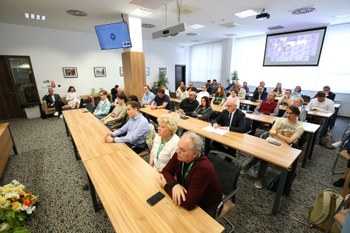
GLOBSEC - Multiplier Event
GLOBSEC in cooperation with the University of Economics and Management in Bratislava organised the multiplier event on May 24, 2023, in Bratislava in the form of an engaging panel discussion after the presentation of the Fakespotting online course.
The invited participants were students and lecturers from the University. For more details, please see the list of participants attached. Speakers: · Katarína Klingová, GLOBSEC · Martin Klus, Member of the Slovak National Council · Sandra Polovková, Post Bellum · Jana Polačiková, University of the Economics and Management
Agenda:
13:45-14:00 – Registration of participants and welcome
14:00-14:20 – Initial remarks from Ľuboš Cibák, Rector of the University
14:20-14:40 – Katarína Klingová (GLOBSEC) – Presentation of the Fakespotting online course
14:40-15:30 – Panel discussion on the importance of media literacy and digital skills
Summary: The event started with the remarks of the rector of the University, Ľuboš Cibák, who welcomed the participants and emphasised the significance of addressing the importance of incorporating media literacy and digital skills into the education curriculum.
The main highlight of the event was the presentation given by Katarína Klingová from GLOBSEC introducing the Fakespotting online course – providing basic definitions and insights into the problematics, explaining the topics and goals of the course’s modules and expected acquired digital and media skills – especially focusing data/information collection comprehension and critical evaluation of data/sources. The practicality and usefulness of the online course were showcased by brief insights into tools and exercises provided by the course testing the newly acquired skills of the course’s participants. Active engagement and questions from both the present students and teachers reflected a genuine interest in the topic and will to increase capacities and incorporate the online course into the university’s curriculum.
Following the presentation, a panel discussion took place, focusing on the crucial role of (digital) information literacy and critical thinking in building active citizenship and societal resilience. During the discussion, the panellists shared their expertise, experiences, and insights on the topic. They emphasised the need for individuals to develop critical thinking skills, media literacy, and the ability to discern reliable information from disinformation. The panellists also discussed the responsibility of media organizations, educational institutions, and government bodies in promoting information literacy and digital skills among the general public.
The need for educational reform and lifelong learning programs for older generations were mentioned as necessary. The event attracted a diverse audience consisting of students and lecturers from the university and the wider public. This allowed for a broader reach and engagement with participants from various backgrounds. Overall, the event served as an important platform for raising awareness about the need to build digital skills and information literacy in Slovakia via various tools including the Fakespotting online course.
Such skills and engaging resources should be fully integrated into the educational system and curriculum. The online course presentation and the subsequent panel discussion highlighted the significance of information literacy and the need to build digital skills among young generations, the elderly and teachers. Development of digital skills and critical thinking will be important, especially with the rise of AI-based technologies and ethical issues and principles need to be set for the use of AI in academia. Digital skills and media literacy impact not only the possibilities of future employment but can influence civic engagement or disengagement, public trust in public institutions and democratic processes.
Link to the event summary: http://www.vsemba.sk/DetailOznamu/informa%C4%8Dn225-vojna-na-slovensku-ako-ju-zastavi%C5%A5-pomocou-informa%C4%8Dnej-gramotnosti Event Link: https://www.facebook.com/events/207003185523127/?ref=newsfeed
https://www.facebook.com/photo/?fbid=736889451769817&set=a.570663185059112
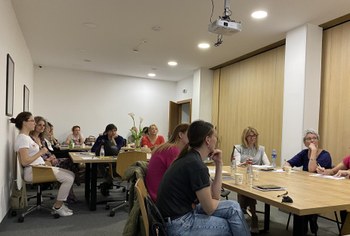
Novi Sad School of Journalism - Multiplier Event
Multiplier Event organized by Novi Sad School of Journalism gathered 36 primary and secondary school teachers in the Vrnjačka Banja city in central Serbia on May 20, 2023. Event was organized in two separate session, with two smaller groups of teachers, because it was envisaged as a discussion with all participants. At the beginning of the event, Vesna Savić presented the Fakespotting project – main objectives and results achieved so far. During the second session, Tijana Bumbić (media literacy coordinator in NSSJ) moderated the discussion about new media environment and its influence on everyday teaching process in formal education.
During this session teachers stressed the importance of information literacy, especially in the context of reliability of the sources that pupils are using for extra-curricular activities. Ivan Subotić, fact-checker working for FakeNews Tracer talked with participants about the most common media manipulations and necessary steps for recognizing false information. Ivan also talked about the challenges of spreading false information on social media and private chat groups, and its influence on public opinion (especially in the time of crisis).
Darija Stjepić, media literacy educator and social media manager working with NSSJ, presented the good practice models for dealing with hate speech online and some examples of simple media production, which could be used in media literacy workshops in the classroom.
The teachers who participated in the “Media Literacy in Education” event already had previous experience in applying media literacy in the classroom and were therefore very active during each session. As biggest challenges they indicated the lack of materials and useful tools for implementing media literacy in their everyday teaching, but also the lac of knowledge among other teachers who are not interested in this topic.
This is why the Fakespotting platform was very well received among them. First of all, they found it useful for their colleagues with low level of media literacy skills, but also for their students. Although not all segments of the platform could not be applied for elementary school age, there are examples and segments that can be adapted for younger ages to use as well. Secondary school teachers expressed great interest for Fakespotting
platform and concluded that the majority of exercises could be used with their students.
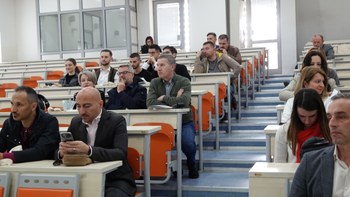
South East European University of Tetovo - Multiplier Event
The Multiplier Event of the Fakespotting project was successfully held on April 24, 2023, at the South East European University. The event was organized as part of the Project Networking & Internationalization Week, which is hosted by the Max van der Stoel Institute.
The panel discussion focused on the important theme of 'Building a resilient and well-informed society,' and it was aimed at promoting media literacy and fake news detection among the participants. The distinguished speakers and experts who graced the occasion included Zylyftar Bregu from the University of Tirana, Rosana Aleksoska from Fighting False News Narratives (F2N2), Elida Zylbeari from Metamorphosis, and Demush Bajrami from the South East European University.
These experts shared their valuable insights and experiences on media literacy and disinformation, and their contributions were highly appreciated by the audience. Furthermore, the South East European University team presented the project outcomes, which included the Fakespotting e-platform, and the national case study that was worked on by the team.
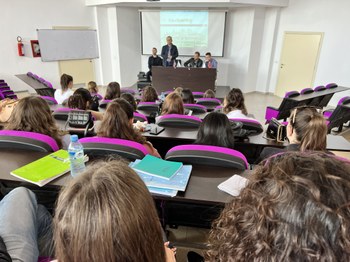
University of Tirana - Multiplier Event
A group of lecturers from the Department of Journalism and Communication (DGK) of the University of Tirana in collaboration with their colleagues at the Aleksandër Moisiu University in Durrës (UAMD), held a conference with students of the Communication Department at this university. The goal was to promote the Fakespotting Eramus+ project, where DGK is a member and contributor. Lecturers Rrapo Zguri, Ervin Goci, Elvin Luku, Alban Tartari and Erblin Jaku were welcomed by UAMD lecturers Viorela Polena, Lorena Licanji and Pranvera Skana and held a presentation and further a conversation with the students. In this meeting, the types of manipulation in public communications were specifically addressed, which attracted the interest of the students, who also made questions and comments. Also, topics such as the use of social media, specifically TikTok, in disinformation campaigns were addressed, as well as lecturers' perspectives on the public perceptions of young people about disinformation.
Waves of misinformation and fake news, both in traditional media and especially in online social media, are already a bitter reality. This phenomenon in public communications distorts the perceptions of societies and affects the way these societies apply democracy.
Based on this, a group of universities from six European countries and organizations under the leadership of the University of Bologna in Italy, launched the Fakespotting Eramus+ project three years ago, in which the University of Tirana also participates through the Department of Journalism and Communication.
In this context, the entire academic body of Department of Journalism and Communication has provided research and scientific contributions, in the preparation of presentation modules and scientific publications.
Within the year 2023, all the products of this project will be published online on a platform open to the public (which will also have its version in the Albanian language). Materials of Fakespotting project (platform) was shared with the students and professors.
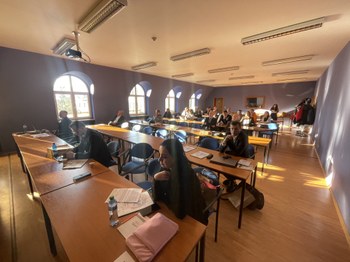
University Matej Bel - Multiplier Event
The date of the Multiplier Event was 9 February 2023, venue: the Faculty of Political Science and International Relations, Matej Bel University in Banská Bystrica, Kuzmányho 1, 974 01 Banská Bystrica, Sovensko. We invited local partners as well as partners from
abroad. The exact timeframe as well as the individual presenters are listed below in the attached event programme.
Programme of the Multiplier Event:
08:00 - 09:00 registration of participants
09:00 - 09:45 Welcome to the event
09:45 - 10:30 Jaroslav Ušiak:
introduction of the FakeSpotting project
10:30 - 11:00 coffee break
11:00 - 12:30 Vladimír Müller: presentation of the current processing of the online modules of the FakeSpotting project 12:30 - 13:30 lunch for the participants
13:30 - 14:30 Jozef Michal Mintal:
presentation of tools and practical exercises of the online modules of the FakeSpotting project
14:30 - 15:00 coffee break
15:00 - 17:00 Jaroslav Ušiak, Vladimír Müller and Jozef Michal Mintal, discussion forum with participants: comments on the presented online
modules and exercises of the FakeSpotting project
17:00 - 17.30 closing remarks on the FakeSpotting project
To begin with, the researchers and the focus of the FakeSpotting project itself were introduced, which focuses on the development of digital information
literacy, through a set of integrated skills that include reflexive information discovery and evaluation, information comprehension and critical evaluation of sources. The ability to search for, collect and process information and to use it critically and systematically, as well as to assess its relevance, affects, among other things, the democratic participation of European citizens, as digital literacy is entirely related to the ability to detect misinformation. The following blocks followed the agenda attached below, which was dedicated to the introduction of the online modules of the FakeSpotting project within IO1, with a detailed explanation of the content and the underlying analyses and questionnaire surveys for their implementation IO2 and IO3. Then we devoted to the introduction of the tools and practical exercises of the online modules of the FakeSpotting project, when we explained to the participants of the event step by step the possibilities of conducting the testing of the concerned participants of the training itself through the project website IO4.
We also focused on the possibilities of using the exercises for trainers, who can also use additional exercises to consolidate the acquired knowledge.
At the end of the event, space was dedicated for a discussion forum and framework as well as partial comments from the event participants, focusing on specific areas within the presented online modules and exercises of the FakeSpotting project on the project website. Participants appreciated the creation of such an online educational project, where they were particularly interested in the final product and its possibility to be deployed in the teaching process at their universities. There was a suggestion from the participants to create a teacher's guide that would help educators (teachers) to better understand their role, and in particular to provide additional exercises that could be introduced into the off-line teaching process - such as suggestions for additional examples, tests, exercises and the possibility of additional exercise templates for the teacher.
The Multiplier Event was highly appreciated during the final discussion as a highly needed tool that has the opportunity to become part of the educational process in universities but also as an individual tool to improve the competences of adults outside the university environment, however, it will
also need to be promoted, possibly with a paid online campaign on social networks, once it is completed, in order to reach a higher reach to the target groups of adult individuals.
Link on project page: https://www.fpvmv.umb.sk/fakespotting Link on invitation and
programme: https://www.fpvmv.umb.sk/data/page/umb.sk/15612/me-fakespotting-svk.pdf Link on dissemination: https://twitter.com/FPVMV_UMB/status/1623731720016039939?cxt=HHwWhsC44a_Z04gtAAAA
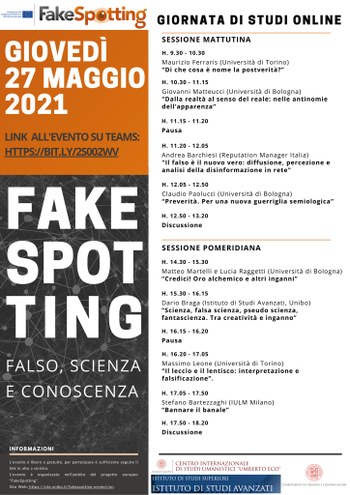
"Centro Internazionale di Studi Umanistici Umberto Eco" in collaboration with "Istituto di Studi Avanzati" will realise a full-day congress on the topic of fake, knowledge and online enunciation within the framework of the Erasmus+ KA2 project "Fakespotting".
👉 Thursday 27 May 2021, 9.30 - 18.30: Maurizio Ferraris, Stefano Bartezzaghi, Giovanni Matteucci, Andrea Barchiesi, Claudio Paolucci, Matteo Martelli , Lucia Raggetti, Dario Braga e Massimo Leone will join the event "FakeSpotting. Falso, scienza e conoscenza" on Teams, deepening and discussing truth, knowledge, fake, machines, post-truth, alchemies, fake news e much more.
The event is completely open and free, welcome and follow the link below:
https://bit.ly/2S002wv
Have a look to the next events at Centro Internazionale Umberto Eco:
https://cue.unibo.it/it/lectures-e-seminari
👉 Download the poster for more information
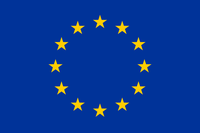
The European Commission's support for the production of this publication does not constitute an endorsement of the contents, which reflect the views only of the authors, and the Commission cannot be held responsible for any use which may be made of the information contained therein.